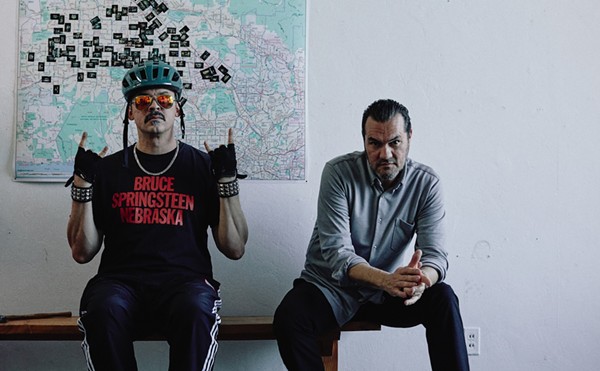Metallica. The biggest - if not greatest - heavy-metal band of all time. After 27 years, the group can still pack arenas and stuff stadiums, if only for the undeniable awesomeness of thrash classics like "Creeping Death." Fifty thousand fans chanting "Die/Die/Die" at Wembley Stadium - it doesn't get bigger or badder than that.
Rick Rubin. The producer of his era, with a résumé like no other, having worked with greats from Run-DMC to Johnny Cash, with metal credits that include Slayer and Slipknot.
Ever since the two giants announced that they would be working together, the question has been: Could the song-shaping guru reignite the band that wrote "Fight Fire With Fire" and epic anti-ballads like "Sanitarium," before its misguided members slowed down and began playing radio-friendly rock on 1991's Metallica (The Black Album), which sold more than 15 million copies and turned the Bay Area thrash-metal titans into rock gods?
The answer is yes - though Death Magnetic is an album with more killer moments than memorable songs. After Metallica spent (by a generous count) 10 years and three studio discs flubbing and floundering, Rubin helps the band craft an album that, at long last, sounds like Metallica - depending on what you think of when you think "Metallica."
On Death Magnetic, Metallica's relative triumph is assembling a passable pastiche of its post-thrash material. The band fuses … And Justice for All's prog-metal jams with a far more successful run at the rawk it mishandled during the Load era. Call it … And Justice for Load, with less "Blackened" and "Justice" and more "Shortest Straw" and "Fuel." Lots of fuel.
As a lyricist, singer-guitarist James Hetfield is a motorhead who can't get over gasoline and hard-luck highways - like on the endless "The End of the Line" - but he's writing on fumes here. He's still stuck in journal-therapy mode. "Broken, Beat & Scarred" is naked and shameless psychomelodrama, but its monstrous "Show/Your/Scars" refrain is just waiting for a mass arena outburst.Boulder-ballad "The Day That Never Comes" sounds pleasant enough after a few listens, but you'll probably agree it was better the first four times you heard it - when it was called "Fade to Black," "Sanitarium," "Escape" and "One." Near the end, however, a sudden eruption of molten riffage finally showcases bassist Robert Trujillo's gooey interplay with guitarist Kirk Hammett, who still sprays rock and fire when the band's brain trust lets him.
Death Magnetic's songs are long, and most of them drag - by the time you're midway into the second track, you'd swear you're somewhere in the middle of the fifth. But the grinds usually pay off: Hammett and Hetfield's volley during "End"'s fourth minute is the first time in ages that Metallica sounds like the band that recorded Kill 'Em All, its 1983 debut, which changed heavy music forever. Later, the entire group hits a smoking thrash groove at the climax of "All Nightmare Long," sounding competitive for the first time since the guys, like emasculated metal Samsons, cut their hair a dozen years ago. Even with Rubin's help, Metallica's ninth studio album isn't quite def, and it's not really magnetic, but it's easily the band's best work since the '80s.












